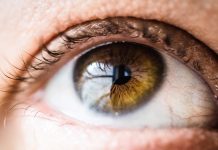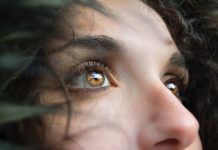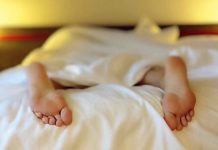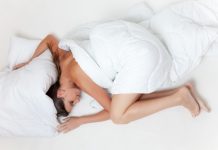”O SLEEP! O GENTLE SLEEP!
NATURE’S SOFT NURSE, HOW I HAVE FRIGHTENED THEE,
THAT THOU NO MORE WILL WEIGH MY EYELIDS DOWN,
AND STEEP MY SENSES IN FORGETFULNESS?”
Henry IV, Shakespeare
The sun with its warmth and light is a crucial factor for plants, animals and humans on Earth. Think of the sunrise and the light where the color changes from dazzling bluish to white light. This light stimulates our daily hormones, out of which particularly serotonin is dominant; we have to wake up.
During the afternoon, the daylight dims down and merges into the yellow orange and finally when the sun goes down, the light fades into shades of red. Over the day we have had an important combination of colors, each of which in the spectrum have their own particular effect on our hormonal functions in terms of sleep.
With the reddish light and when dusk and darkness comes, our hormonal flow changes. We see an increase of melatonin, our sleeping and night hormone, which lets us know that we’re heading towards the nocturnal phase of sleep. We are tired after the day’s chores and start to feel sleepy.
The night hormone – melatonin – is released in our body and we fall asleep. It’s a very finely tuned mechanism, almost like an on/off switch that turnes on and shuts off the sun.
Some of you might be asking: Is it really that important and does it have anything to do with my sleep? Does it also apply to me? Yes, it applies to all creatures. We are all subject to light and its effect on our organism, our brain, our hormonal system, etc. Without light, there is no life. The light controls our inner life and have a very big impact on us both mentally and physically, but particularly when it comes to our ability to sleep! The key to good sleep is light. Read here if you want to read more about this, læs her.

Modern life robs us of sleep and quality of life
The condition described above was the ideal state of a time several hundreds of years ago. Our modern and western life is not like this today. We are under a lot of mental stress and demands, partly from ourselves, and from our surroundings, circumstances surrounding the family and children, from our work, our relationships and everything that comes with the balance of stress, good or bad, which makes it difficult to form good sleep habits on an everyday basis.
Not a day goes by without the media, television, magazines, newspapers, magazines, etc. stating how difficult it is for many people to get adequate sleep. There is currently a strong focus on health, but in my opinion, have a focus on sleep and good sleep habits need just as much attention as the importance of healthy food and exercise. For our life quality’s sake, we need more awareness of what it means to sleep well for a longer period of time.
No one really talks about poor sleep habits. The trend is overall that there is so much we need to achieve that there are too few equal opportunities to make sure that we get sufficient and good-quality sleep. But getting this type of sleep will offer its own benefits and give us the opportunity to meet the new day well-rested and in great health. It’s all about creating peace and creating optimal conditions for good sleep. Establishing good sleeping habits is an artform that needs practice.
Is poor sleep your standard?
Going to bed and getting the quality sleep we need once the day is over should be as natural as breathing.
The requirement for sleep differs between individuals and can be very different. Some people need 8-9 hours, while others make do with 4-5 hours a night and are just fine long term. A teenager can comfortably sleep 9-10 hours or more. Infants sleep almost all the time for the first several weeks and smaller children, like for example my 4-year-old grandson, easily sleeps 10 to 11 hours continuously. When I was young, I even slept 24 hours once with just a few trips to the bathroom. This property just to sleep as we like to be too many lost and with increasing age, it becomes increasingly difficult for some to grab the long sleep.
Having some trouble sleeping sometimes is medically irrelevant, but when it becomes a pattern, it could become chronic, and then you suddenly have a health problem with bad nights and long days of daily fatigue and reduced capacity to function. This can have serious consequences for your overall health long term.
But this is quite easy for people to adjust for most people. There are only a few things you need to do right.
Correlation between poor sleep and sickness
The Danish Center for Sleep Medicine in Copenhagen started the project “Healthy Aging” in 2009 regarding sleep and sleeping patterns and the correlation between sleep disorders and sickness. The experiments showed that many who had difficult challenges with sleep, had a weakened immune system, high blood pressure, stress, pain, obesity, cardiovascular disease. Diseases such as diabetes, Alzheimer’s, dementia, etc. were also seen to be related as a direct result of poor sleep.
Other studies confirm this, including eat the chronically sleepless what in kcal. corresponds to a main meal more. For example. be more snacks, and a higher intake of sugary drinks, candy, cakes and snacks. The significantly increased weight, also contributes to an even worse sleep. It seems that sleep is one of the keys to many of the lifestyle disorders and diseases that we struggle with today.
Why you suffer from sleep deprivation
How do you know if you haven’t charged your sleep account with enough credit? A good indication that you wake up and feel more tired in the morning than when you went to bed. If you can usually sleep without having any issues, so dishes some nights good sleep up to it all, and everything can be good again.
Perhaps you will recognize that meeting the day lethargic: You’re tired already a little up the morning or early afternoon or toward evening. To be blunt, less focused on the tasks you are somewhat indifferent, possibly. you have shorter fuse and increased stress on assignments. You will easily irritated or detachment from the day’s tasks, closes off and isolate themselves or are a bit quiet and not so smart and stimulating company of others.
It can provide overall increased stress and pressure; days to get over. And we know it all, we have come too late to bed, got a few hours and days are long. We are sluggish, may not perform properly on the job, relax, not worth much. This may for some be corrected with a few good nights.
But for a large number of people today are extremely severe and more chronic sleep problems of various kinds. They may have difficulty falling asleep, tired, maybe sleepy, but sleep would not come and mind wandering and speculation runs away with one. That which we call sleep onset, sets in and no one is, perhaps for hours, looking at the ceiling.
Others may have trouble with a too light sleep. They wake up easily, sleep shallow and does not come into the deep and restorative sleep.
Others may have trouble sleeping a full night, they wake up early in the night and have trouble falling back to sleep. The result is that they wake up and are tired, dragging themselves out of bed and through the day.
You can have variations and combinations of these, for example. to lie awake for half and full hour before sleep sets in, and then wake up again after a few hours, for example. at a time or as some do at 2-3 o’clock. Failing awakening pm. 4-5 can result for some is often that they do not sleep more that night. Is this a pattern over time, you get in trouble, and there may occur relative health problems.
This scenario is a “normal state” for many – especially young families with children. Working life and all the convenience leaves only a few hours left, and all the convenience you need to reach, eating into the time which actually belongs time to sleep. This is the dilemma of modern man. The task is to take time back to sleep.
If you realize that sleep comes before everything else, you have the ability to change, otherwise not. Sleep researchers recommend that you get as many minutes as possible within 24 hour.
The normal stages of sleep
If you got under the covers and start the journey into the world of sleep, you go through the following phases:
Phase 1: After you have closed your eyes, you slide into phase 1 of sleeping, which is approx. 5-10 min when nothing happens. Then slide deeper into the actual sleep.
Phase 2 Sleep is light sleep – the brain waves become slower with softer and more volatility. This second sleep stage fills the adults around half of sleep. Here we can still be bothered by noise, agitation and speech as we head into a deeper sleep.
Phase 3 The deepest sleep. Here are the brain waves – the so-called delta waves, very slow. There is really quiet and you sleep very deeply. Here recover the body and brain maximum, and it is here that you might need. talking in his sleep, and children wet the bed. You should preferably not be awakened in the middle of this phase – you what, you can be perceived as very drowsy and confused, may find it difficult to know where you are. It is in this phase, you can test the alarm clock. You should preferably not be awakened/wake here – just after this phase comes the important.
Phase 4 REM sleep, called Rapid Eye Movement sleep, which refers to the stage of sleep in which we dream. This is called the “dream sleep” and this is important and of great importance to our mental life. It is during REM sleep we treat all our thoughts, relationships and daily experiences, fix problems, systematize, find solutions and throw away.
REM sleep accounts for 20-25 percent of the adult total sleep. The dreams will stop at the end of the REM phase and then fall back in phase one, and it all begins again. At the end of the night will REM periods up more and more, which is why we often when we are rested, wakes up in a dream.
Depending on how we are arranged, we have a sleep cycle of between 90 and 110 minutes, giving 4-6 laps before we wake up, and the night is over. A sleep of about 8 hours.
During the dream stage, the brain works hard to sort through all the impressions we have experienced during the day – a sort that is vital for us to get it all to fit together. Do we have a problem, take care of the brain during sleep. We all know the expression: “I’ll sleep on it!”
Don’t worry – you can get your sleep back
Do not despair, even if you belong to the relatively large percentage of people who sleep too little or sleeping badly and/or have a poor sleep quality. There IS hope for many – you just have to form some good habits.
There may be many reasons why you feel hindered from getting good sleep. You can see them below. Take them one by one, or take them all. Stick to your good habits because sleep is your friend, and you must take care of it – once you have it. If you don’t stay on the right track, sleep might not find you again.
That being said, there are those who for medical reasons have challenges that require help and assistance from professionals. I myself in my younger days had a single night at the sleep clinic for a period of insomnia. Insomnia may periodically occur in life without any known easons. It sometimes goes away on its own. Often these are external causes that you fail to see.
If you have pain, you must seek help in order to properly relieve of remove this. However, I have advised many to better sleep, even people with challenges that they just mentioned. You can get in touch with me and I’ll give you advise, support, help. There is much you can do, and sometimes it’s quite simple what it takes. Contact info can be found at the bottom of the article.
1. Get on the sleep train in time
In my days as a student, I was at a sleep conference. I remember the story of the “sleep train” particularly well, and how important it is that we make sure to jump on the train in time. The train runs with small variations in two hour intervals: at 8-10 o’clock, 12-2 o’clock at night, and so on.
In all my time as a therapist, I have, when I had to help my patients to sleep, always taught them about sleep train and it really works. Are you currently challenged with being able to fall asleep and/or sleeping badly, you should always think of this. Put simply, you miss the train, there are two hours of waiting for the next run!
Do you want to be fresh and rested the next day, and you need to up for example. pm. 6:00, so do you plan backwards. Want the recommended eight hours of sleep hours, it means that you should be in bed no later than. 22:00 – almost in time to sleep when the train is running. Misses you exit, because you just need to achieve something, thoughts, speculations, problems, practical things, etc. – misses you often drowsiness that will hopefully come to a good sleep, which comes perhaps just 10-15 minutes after you have put your head on the pillow. I strongly recommend that a ticket to sleep train.
2. Relax in the evening
A good night’s sleep requires a preparation until the night where you ahead of time preparing for having to sleep.
This means that you get today’s work done in time, so they do not interfere. Jobs, work, stress, speculation that tomorrow’s problems and everything else just heard tomorrow to. All chores must be completed and cleared up before bedtime.
It is important to understand for those who want to sleep. You should really try to dedicate you and take the task seriously. There is no shortcut, if you have severe sleep problems and serious.
3. Turn off the screen
The most common and even biggest obstacles to good sleep, insomnia, difficulty falling asleep and uninterrupted sleep, screen time before bed.
I recommend that you abstain completely from mobile, iPad, PC and electronic games and the use of all kinds of electronics pm. 19. No television at the same time. Turn down the lights in your home, close the noise out and sit down at an old-fashioned incandescent bulb, which emits warm soft and reddish light – and read a book or magazine.
You will very quickly be successful if you stand firm on this issue. The shade of blue light tells your brain that it is still today and keep your sleep hormones on standby. A rule of thumb says that it takes one to two hours after you have stopped looking at the screen to sleep occurs. Many of those I have helped to sleep, have a few days to weeks achieved a dramatic improvement by simply dropping all electronic activity.
4. Alcohol is banned
If you enjoy a glass of wine, beer and anything containing alcohol percentages, it is anathema, if you want to sleep. Search the web. Dive into science, and see the dull reading that alcohol under a not something that brings good sleep. It seriously effects on the brain with toxicity which at best is somewhat sleep inducing, but gices poor sleep pattern. You will find it harder to latch onto a continuous uninterrupted sleep through the changing phases of sleep.
Alcohol also has a bad influence on the intestinal system and the hormonal system and thus indirectly on sleep. Everything hangs together. Are you smart here, you enjoy a single glass of Friday and Saturday. Doing so provides a quick overview of how much you can “tolerate” sleep wise. It usually takes a few days to get back to sleep again.

5. No more coffee, tea, and soda
It probably won’t surprise anyone what happens in the body when you release caffeine free. Do you have an ambition to be able to sleep – do not lose sleep, it’s a farewell to all kinds of drinks with caffeine. Cola, energy drinks, coffee, tea and other stimulating drinks are not compatible with the desire for good sleep.
Be aware that there are added caffeine in foods, cocoa, dark chocolate and most probably did not know that a TREO effervescent tablet contains 50 mg of caffeine. The same as a cup of filter coffee! Particularly strong dark chocolate is for me a true sleep killer. A single slip and I lie awake for hours!
10 other helpful advice
- Reduce the brightness
Something that works and tested – not at least scientific – is that you in the evening lowers the brightness of the home. Soft reddish light with low lumen is recommended. Strong light like LED and halogen are both sleep killers, and so is noise. - Use earplugs
During the transition phase, use earplugs and sleep mask. Be well hydrated throughout the day – drink water! Hold with sugar/candy intake. - Go for an evening walk
Go for a little evening walk of 15-20 minutes. Get some fresh air, exercise and detach from everything. Many problems and thoughts fall into place as you go. Yoga and meditation and mindfulness are also good sleep aides. - Think about what you eat
Avoid heavy meals and make a good protein portion of your food. It provides a good satiety. Do not eat too late at night and most within three hours of bedtime. Eat some biscuits and a banana before bed. A little carbohydrate and banana in potassium and works well soporific. Drink a sleep-tea; valerian, hops and valerian, etc. - Use sleep oils
Genuine essential oils: Here there is a wide range, you can use both for diffusing in the home and in the sleeping compartment and for application to the body and under your feet. Lavender, Wild Orange, Roman Chamomile, Cypress, Ylang Ylang, Sand Elwood et al. Really good sleep oils. Here you do not use synthetic, diluted and adulterated, only pure natural essential oils. I gladly recommend. - Move if your partner is being noisy
If your partner is being noisy, then move for a period of time – or move the bed. Tilt your head to the other end away from the partner as it reduces the noise. - Change your sleeping position
Some people achieve better sleep by turning on the sofa direction, that is, by lying inverted in bed. Many have gotten significantly better sleep pattern by not having his head against a wall. Try sleeping with your head away from the wall/windows. - Use blackout curtains and air out
Sleep in a dark room and possibly with sleeping mask on. Air out, and make sure you’re not too hot. The best thing is 14 -16 degrees with a heavy blanket on. - Use sleep patches
I must remember to remind you that you can also use the patches from LifeWave. You can make full take these forward and strengthen the ability to sleep well. These include the sleep patch Silent Nights, Aeon, Carnosine and Nirvana. Although I have great results with the latter two in combination with the others. - If you DO wake up
If you do wake up without notice at night and can’t fall asleep back again after 10 minutes with deep breathing through the nose, you stand up. Do not turn on the lights, but walk around in the dark and keep warm. Maybe make a cup tea – preferably with a little bit of honey and go back to bed after 20-30 minutes. It is absolutely forbidden to light candles, look at screens and/or start working.
“I’ll sleep when I’m old”
The old saying actually isn’t correct! No, you can’t wait to sleep until you’re old. A simple calculation shows that we are going to sleep a third of our lives – that’s it. If you want to grow old, then you have to get enough sleep.
The magic formula for a good healthy and long life says: “A good night’s sleep equals eight hours.” Simple! If it this is difficult, it’s easy for you to learn with time.
Good sleep can be taught and it can be learned quickly – and I’d be happy to help. I want readers to have luck in finding and keeping good sleep. See the contact info below the article where you can both chat with me and ask questions.
Welcome!




































